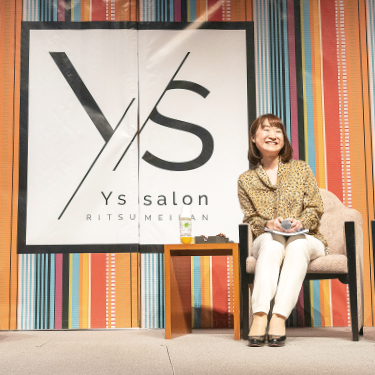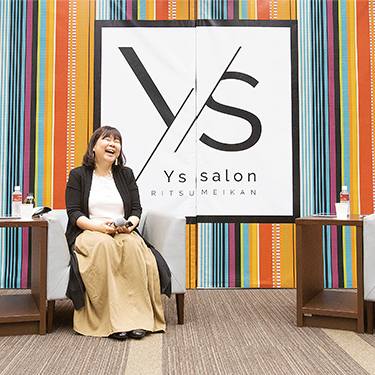- Matsubara
- We have received many questions about how you harness your unique strengths in the pursuit of your research. “I was impressed by how you seized various opportunities to make new things your own and expand your field of research. As a researcher, what do you feel your strengths are and what message of encouragement do you have for us students?”; and “Based on our own personalities and interests, what do we need to think about and do in order to forge ahead and identify value in society like Associate Professor Nonaka? What hints can you give us about how to live?” Indeed, I feel that you do not hesitate to seize opportunities and keep pushing the envelope. How have you been able to maintain this approach?
- Nonaka
- Thank you. Since coming to Ritsumeikan University, the number of times I have been commended for tackling many challenges and “making things my own without hesitation” has really increased. I think my personality is very different, but one of the reasons I am able to do this is because I am inspired when I encounter the potential and richness of a research subject.
There have been two times in my life so far where I felt that I was born to be a researcher, and one of those was when I started working on the jelly technology. Looking at my career as a researcher, when I encountered this technology, I realized I wanted to do everything possible to spread the word about it. I was so inspired that I could not sleep due to the excitement. This is why, even though the topic falls slightly outside my area of expertise, I felt like I wanted to pursue it. - Nakatani
- If you feel that something is for the good of society, you must give it a try without deciding at the outset that it would be a waste of time. If you do this, I am positive you can find something that you can use in your research.
- Matsubara
- When students see a young faculty member working on international projects and carving out new fields, they may think he or she is someone who knows exactly what they have to do and goes about doing it. But instead of trying to search for some kind of resolution or fixed idea just from within yourself, you should enjoy the people you meet and the things you discover in whatever environment you happen to find yourself in. If you commit yourself, you may find a project becomes even more enjoyable. If you can develop this kind of approach and put it into practice, you will find it opens up doors to new research communities and projects. This is what I took away from Associate Professor Nonaka’s speech today.
- Nonaka
- I agree wholeheartedly.
- Nakatani
- Personally speaking, I am a little doubtful about just how many people actually operate according to some kind of resolution or fixed idea; though I also side with the opinion that questions whether that in itself is really such a good thing. Associate Professor Nonaka is not just going with the flow even though she doesn’t have a fixed, definite plan in mind about where to go; she keeps her eyes and ears open and can determine for herself what is good or bad, comfortable or uncomfortable, and important or unnecessary. Her approach is sound because she makes the right decisions about what action she should be taking.
- Matsubara
- We have another question: “I am completely disinterested in my department. I want to do something that interests me, so what should I do?”
- Nonaka
- In my case, I have been able to seize opportunities that arise when I meet people off campus to do new things. Just before I turned 30, I studied abroad for the first time, and that’s what made me want to become a researcher. I always tell my students that when you are young, you don’t know who you are yet, so thinking you are “no good” at something might not be correct. You can change yourself, and things you thought you were no good at could tie into your specialization, so you should question your own motives in a positive way. Since coming to Ritsumeikan, many people have said I seem to really enjoy myself. I hope the students can also enjoy themselves and try their hand at many things without hesitating. Hopefully, we can work together on something.
- Matsubara
- Those are very encouraging words. Chancellor Nakatani and myself are the same age, but we are still taking on new challenges. The world is full of many things you don’t know and the situation is always changing, so I think you can discover a “new you” if you want to. Thank you everyone for today. It was an enjoyable session, and I want to thank you for all your thoughtful insights. I look forward to seeing you again at the next Ys Salon.
 the Live Questionnaire System
the Live Questionnaire System
We exchanged views with participants in real time using the Live Questionnaire System.
What made you want to study systems engineering?
I would like to know more about how the three topics of automobiles, jelly, and robots are related.
You said the jelly is sustainable. Does that mean it could be used in outer space or other fields going forward?
I hope sake jellies can be used to rediscover Japan’s outlying regions and local sake breweries.
I am completely disinterested in my department. I want to do something that interests me, so what should I do?
When the robot is carrying things through pipes, can it use existing pipes like water pipes and gas pipes?
For example, if you are using water pipes to carry things, would you have to turn off the water while the robots were inside?
I have a question about the jelly. The idea that turning various foods into jellies can expand the potential of food really piqued my interest. Going forward, will it be possible to change the texture (softness) of the jelly?
I was impressed by how you seized various opportunities to make new things your own and expand your field of research. As a researcher, what do feel your strengths are and what message of encouragement do you have for us students?
Based on our own personalities and interests, what do we need to think about and do in order to forge ahead and identify value in society like Associate Professor Nonaka? What hints can you give us about how to live?”
I was impressed by your idea that the first thing you should do when you encounter a new possibility is to give it a try and how you can uncover new things by changing your approach as you go along. What tips or secrets do you have for changing your mindset when you change your approach?




